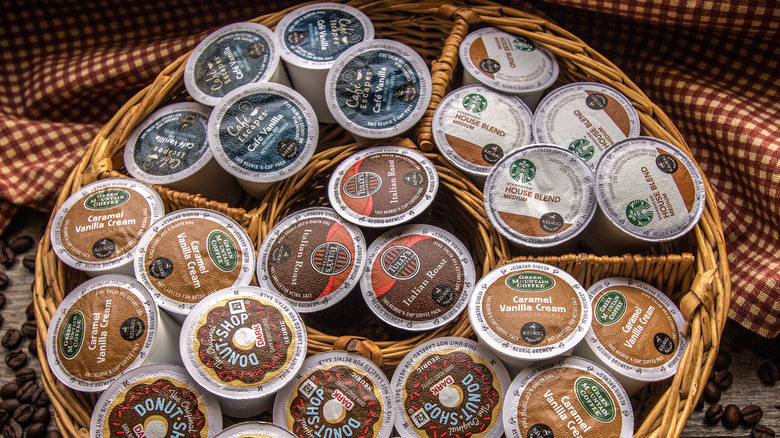
There’s something comforting about Keurig cups — also known as K-Cups. They add a touch of magic and convenience to your morning coffee-making process. You wake up, walk over sleepily to your coffee station, pull out a pod of your choice, slip it in the coffee maker, and wait just a few minutes before you have a cup of freshly brewed coffee in your hands.
If you’re a K-Cup aficionado, you probably do both these things: You tune out those coffee drinkers who swear that brewing from tiny store-bought cups won’t give you the best coffee, and you buy K-Cups in bulk to save on cost. But if you’ve found a stray K-Cup in your drawer, you might wonder if it’s still good enough to use.
The answer is a little more nuanced than you think — at least with the coffee grind kind. While K-Cups don’t technically go bad, they do carry a “best before” date — which might be a little hard to find. You can shine a light on the side of the cup or even look for the date under the box they came in. The “best before” date on K-Cups doesn’t mean that you’ll get sick if you do decide to brew a cup of coffee after the date has passed. However, they do indicate a time past which the quality and flavor of the product will decline. Should you stop drinking coffee if you find your K-Cups have exceeded their “best before” date?
There might be a little time left in your K-Cups

Despite what the best-before date indicates, the general estimation for accepted K-Cup shelf life is anywhere between eight to 12 months if stored correctly. You don’t need to worry too much — consuming a cup of coffee from an expired coffee pod won’t be as bad as, say, taking expired medicine. Understanding how the pods are made could also give you an idea about their shelf life.
The K-Cups typically go through a nitrogen flushing process, after which they’re sealed firmly using an aluminum foil. This keeps the coffee grinds inside from being contaminated by oxygen, moisture, and light. If you store your K-Cups well (away from sunlight, moisture, and in a cool dark place) and they’re not unsealed, punctured, or damaged in any way, you can use your coffee pods for some months after they have expired. But if you do notice any weird smells coming from the packaging or any holes in the product, you should unseal one and check the contents inside. The presence of mold in there is a good indicator that your coffee has passed its prime. That particular cup is best left outside of your stomach.
If you don’t find any mold, but you notice that your coffee isn’t as flavorful as it used to be, this could be another sign that your coffee is past its shelf life. Discard it — who wants to drink a bland beverage in the morning anyway?
Storage ideas for K-Cups
im obsessed ✨
#nespresso
#nespressopods
#nespressoorganization
#coffeebarideas
#espressotiktok
#amazonfind
TikTok is full of great ideas on how to safely and efficiently store your K-Cups. You can place them in a pod organizer inside your drawer, put them on a coffee pod carousel next to your coffee machine, or hang them on a wall using a wall-mounted pod organizer. The options are endless.
The key to storage when it comes to K-Cups is to keep them away from moisture and sunlight — and, of course, to place them somewhere close to your coffee machine so you don’t have to walk around a lot while trying to make yourself a cup of coffee. It may also be a good idea to store them separately from any sharp utensils in your kitchen. You don’t want to accidentally puncture the aluminum foil in your K-Cups.
K-Cups are made for convenience. They’re easy to use and can be purchased in large quantities. Storing them well will prolong their shelf life so you don’t have to worry about getting sick from drinking one after it has expired. If you are concerned about the level of plastic you’re discarding with them, though, you could try purchasing a reusable K-Cup and see how that works for you.




